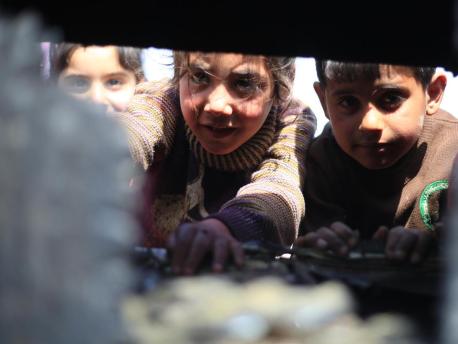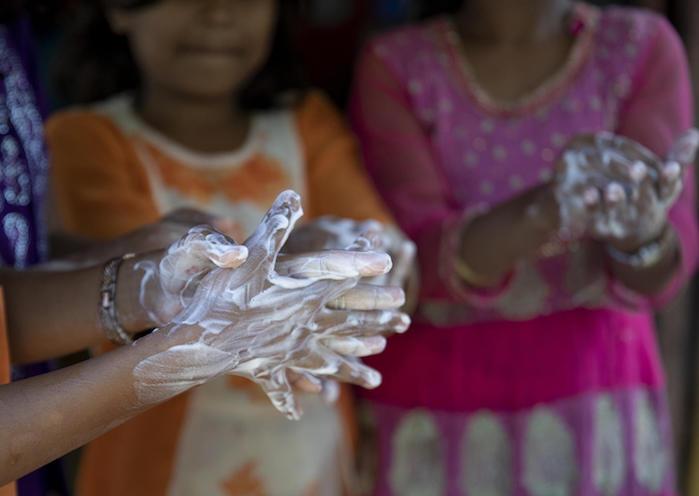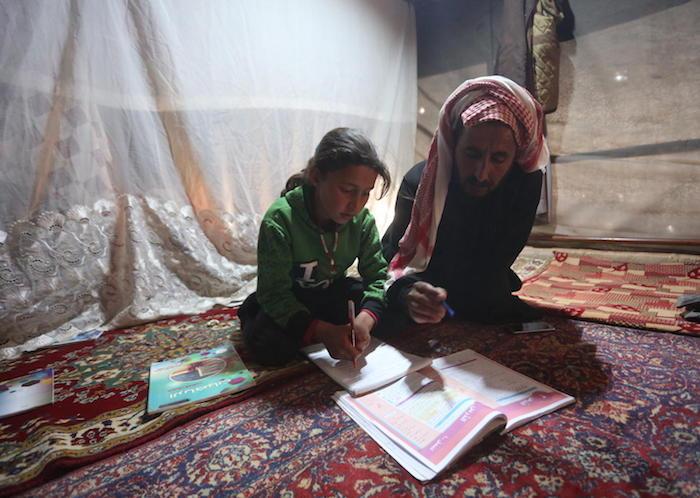
Help UNICEF Reach Refugee Children During Ramadan
COVID-19 is making life even harder for refugees and asylum seekers pushed from their homes by violence. Here's how you can help.
As the holy month of Ramadan begins, Muslims around the world face unprecedented challenges. COVID-19 will prevent many larger families and groups from gathering. Evening prayers at many mosques have been suspended until further notice, while curfews, lockdowns and shortages will make it harder to shop for food.
But the hardships are even greater for the millions of refugees and asylum seekers who have been forced out of their homes and across borders by conflict, violence and other forms of harm — nearly 60 percent of whom come from Muslim-majority countries, according to the UNHCR, the UN Refugee Agency.
Social distancing is virtually impossible in a crowded refugee camp
Maintaining social distancing is virtually impossible in a crowded refugee camp. Frequent, thorough handwashing — the simplest and most effective intervention to prevent the spread of the virus — is a constant struggle when soap and water are in short supply. Under these conditions, health workers warn, infectious diseases spread like wildfire.

On March 9, 2020, children wash their hands with soap at a UNICEF-supported learning center in the Kutupalong camp, a Rohingya refugee camp, in Cox’s Bazar, Bangladesh. With learning centers currently closed to prevent the spread of the coronavirus, UNICEF continues to distribute reliable information and essential supplies, providing safe water and soap for around 240,000 Rohingya refugees, over half of whom are children. © UNICEF/UNI315489/Himu
"Displaced children are among those with the most limited access to prevention services, testing, treatment and essential support," UNICEF Executive Director Henrietta Fore and UN High Commissioner for Refugees Filippo Grandi said in a joint statement today announcing a new initiative to expand refugee children's access to protection, education, and water and sanitation services. "In addition, the pandemic and containment measures are likely to have negative consequences for their safety and education, which were precarious even before the outbreak of the disease."
Less than half of school-aged refugee children were enrolled in school before the pandemic
Less than half of school-aged refugee children were enrolled in school before the pandemic, with that number dropping to 1 in 4 for high school students. More displaced children are now likely to be out of school for a prolonged period. Some might never return.

On April 9, 2020, 9-year-old Maria follows a pre-recorded lesson on her father's smartphone in a tent at the Kili IDP camp in rural Idlib, Syria. “I like getting the lessons this way, I like to keep learning,” says Maria, “But I really would like to get back to the school to meet my friends and play with them.” UNICEF is supporting remote learning programs while schools are suspended to prevent the spread of the new coronavirus, and ramping up public information campaigns and hygiene kit distribution to help families like Maria's stay healthy. © UNICEF/UNI322672/Suleiman
UNICEF and UNHCR are working together in more than 40 countries to transform the quality of life for refugee children and their families by doubling the number of refugee and returnee children with access to education; ensuring that they can access clean, sustainable and environmentally sound water and sanitation services; addressing child protection concerns and identifying barriers to inclusion in national systems.
Like all children globally, refugee children deserve a fair chance in life, and to see their rights fully realized.
"Like all children globally, refugee children deserve a fair chance in life, and to see their rights fully realized," said Fore and Grandi. "Though their lives have been disrupted by violence, displacement and now a pandemic, their chances for a dignified future will be bolstered if they have equitable access to the support and services they need."
Your generous gift will help UNICEF be there for vulnerable children when they need it most.
Top photo: On April 5, 2020, children sift through the wreckage left when their family’s tent caught fire from a gas stove at a camp in Idlib, northwest Syrian Arab Republic. Families in the camp are taking precautions and isolating as much as possible to limit potential exposure to the spread of COVID-19. While this family searches for their own space, they will have to double up with relatives who live nearby. © UNICEF/UNI319702/Albam


